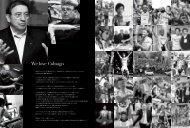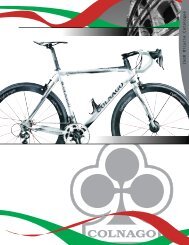Create successful ePaper yourself
Turn your PDF publications into a flip-book with our unique Google optimized e-Paper software.
FITNESS<br />
Pedalling to<br />
prove a point<br />
In 2009, young graduate Julian Sayarer broke the world record for<br />
fastest circumnavigation of the world by bike. It wasn’t about the<br />
record — he wanted to make a stand, as he explains in his new book<br />
Words David Bradford Photos Julian Sayarer<br />
J<br />
ulian Sayarer is grinning<br />
warmly as he finds me,<br />
eventually, in the vast<br />
meeting space upstairs in<br />
London’s Southbank Centre. He<br />
looks different from how I<br />
remember him from our first<br />
meeting back in 2011: somehow<br />
less intense, less wary. He is a<br />
changed man, he admits.<br />
“I’m nearly 29 now, whereas<br />
I’m a 23-year-old in the book. I<br />
really like that young man, even if<br />
he is an angry young man, but<br />
he’s not who I am now.”<br />
The book in question is<br />
Life Cycles, a wonderful,<br />
vivid account of his 2009<br />
circumnavigation of the globe<br />
(18,000 miles) in 169 days, setting<br />
what was then a new record. The<br />
angry young protagonist, Sayarer<br />
at 23, didn’t particularly care<br />
about the record; he was<br />
pedalling to prove a point.<br />
The point was that anyone<br />
can (and should) ride a very long<br />
106 CYCLING ACTIVE SEPTEMBER 2014<br />
way without any need for<br />
big-budget backing. He was<br />
enraged by what he regarded as<br />
the tainting of long-distance<br />
cycling by the man who had set<br />
the circumnavigation world<br />
record in 2008, Mark Beaumont.<br />
Sayarer hated that Beaumont’s<br />
ride was backed by large<br />
corporations, and detested<br />
its portrayal in a BBC TV<br />
documentary The Man who<br />
Cycled the World as a gruelling<br />
feat of heroic endurance.<br />
Indignant blogger<br />
The point he wanted to prove<br />
was that riding 90 miles per day,<br />
as Beaumont had, required<br />
neither superhuman tenacity nor<br />
the backing of big business and<br />
did not warrant a media-spun<br />
narrative of extreme hardship.<br />
Sayarer set off on June 10, 2009,<br />
averaged 110 miles a day, finished<br />
on December 4, 2009, and beat<br />
Beaumont’s record by 25 days.<br />
For many people, his<br />
record-setting ride was admirable<br />
but his anger unseemly,<br />
especially the blog he wrote in<br />
December 2009, soon after<br />
arriving back in the UK, in which<br />
he made highly derogatory<br />
remarks about Beaumont and<br />
poured scorn on his “sell-out”<br />
ride and corporate ambassador<br />
status. Is the older, calmer<br />
Sayarer inclined to distance<br />
himself from those comments<br />
made by his younger, hotterheaded<br />
self?<br />
“A big part of it was that we<br />
[he and Beaumont] were similar<br />
“I’m 23 in the book. I really like that angry<br />
young man, but he’s not who I am now”<br />
ages, both politics graduates,”<br />
says Sayarer, “which meant<br />
something to me, and we were<br />
both into cycling long distances.”<br />
He defends his comments on<br />
grounds of their context: the<br />
global economic crisis was biting<br />
hard in 2009, and he was airing a<br />
sense of injustice about corporate<br />
corruption and the social ills he<br />
had witnessed during his<br />
upbringing “in a really crappy<br />
town” — formative years from<br />
which he inferred “the world is<br />
not OK”.


















